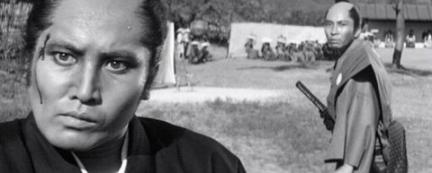Obscure Japanese Film #68
Shinpachi (Kinnosuke Nakamura) is a low-ranking samurai from a nevertheless prestigious family. His sense of pride has made him quick to take offence so, when a higher-ranking samurai (Shigeru Koyama) from the same clan criticises him for not taking sufficient care over the condition of the weapons, Shinpachi answers back and an argument begins which escalates into a duel. This first duel leads to further duels and Shinpachi finds himself increasingly backed into a corner when those in power decide to rig the game in order to suppress his protest once and for all.
 |
Kinnosuke Nakamura
|
While less well-known overseas than Toshiro Mifune or Tatsuya Nakadai, Kinnosuke Nakamura was an equally big star in Japan. I find him more effective in some films than others, but he’s especially good as the mad Lord Horikawa in Portrait of Hell (1969) and he’s equally good here portraying another character whose sanity is questionable. While some may feel he goes over the top, for me his twitchy intensity suits the role perfectly.
 |
Tetsuro Tanba
|
The other actors who make the most impression here are the always-reliable Masao Mishima as the sheriff who finds himself in a difficult position, Tetsuro Tanba as Shinpachi’s formidable second opponent, and, perhaps best of all, Eitaro Shindo as the rather worldly monk at whose temple Shinpachi takes refuge.
Of the eight films by director Tadashi Imai I’ve seen so far, this may be the strongest, but is certainly not the most typical. Imai made films in a wide range of styles and settings, but this work is reminiscent of the artistically-ambitious samurai films of Akira Kurosawa and Masaki Kobayashi – unsurprising as the original screenplay was written by Kurosawa favourite Shinobu Hashimoto, who also penned Kobayashi’s Harakiri (1962) and Samurai Rebellion (1967). Hashimoto uses a complex flashback structure which works very well and lends a sense of inevitability to the tragic events which unfold.
The extras on the Eureka Blu-ray by Tony Rayns, Jasper Sharp and Tom Mes are all interesting and well-informed and avoid becoming too dryly academic. I had the impression that the film is generally seen as an attack on authority and the way it oppresses the freedom and dignity of individuals, and this theme certainly fits with Hashimoto’s scripts for Kobayashi. However, although this may well have been the intention, the character of Shinpachi is not terribly sympathetic and I felt that the film made a different point more effectively – the dire consequences which ensue as a result of Shinpachi’s refusal to ignore a criticism show the dangers of placing pride over pragmatism, and he is perhaps just as much at fault as the system he is caught up in.
Revenge also benefits from a strong score by Toshiro Mayuzumi, who on this occasion strikes a good balance between his desire to use modernist techniques and the necessity of serving the drama. The black-and-white ‘scope cinematography by frequent Tadashi Imai collaborator Shunichiro Nakao is also first-rate and looks great in Eureka’s release, as does the cover art by Tony Stella. One minor quibble, though – the cast list in the booklet only lists five of the actors, not even including Eitaro Shindo, who plays a major role in the film.
Eureka Blu-ray







